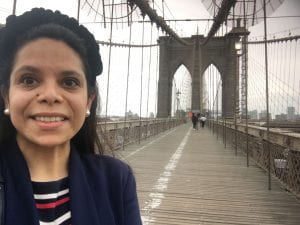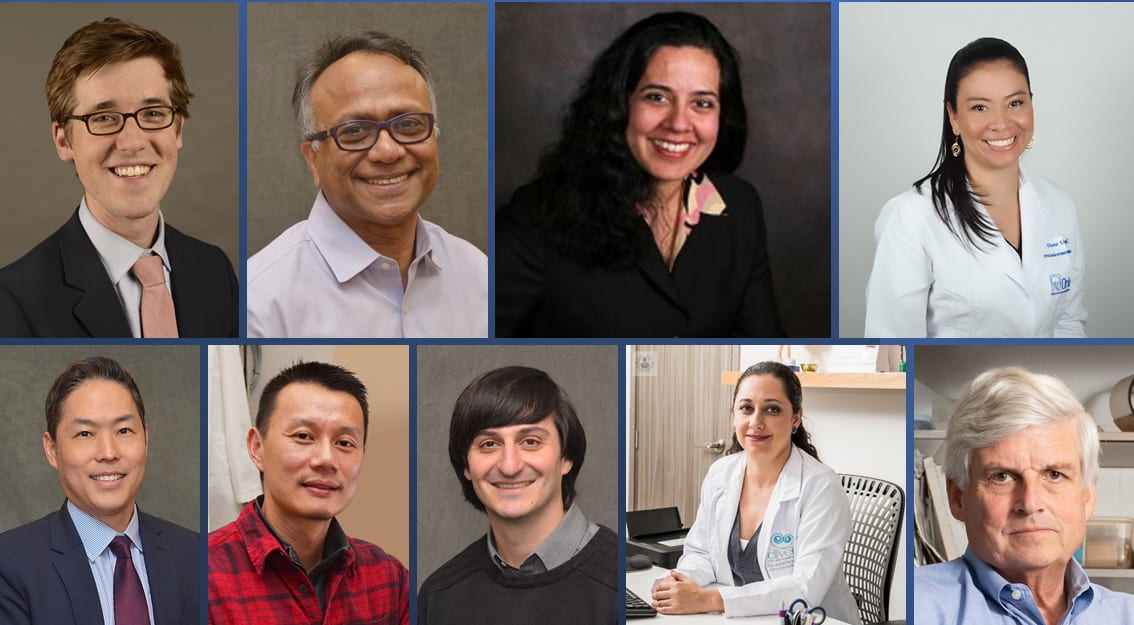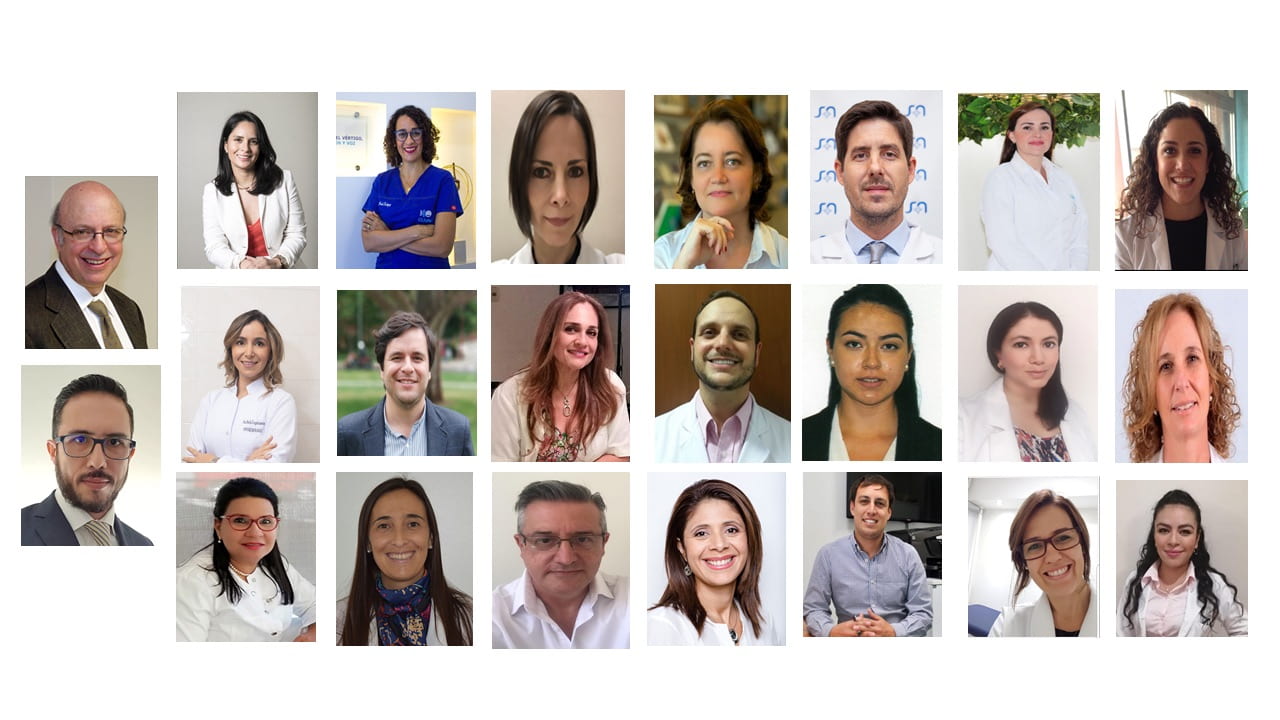
About the Author
Melissa Castillo-Bustamante is an Ear, Nose and Throat doctor,originally from Medellín, Colombia. She is currently a Research Fellow at the Massachusetts Eye and Ear Infirmary- Harvard Medical School, in the group of Aaron Remenschneider.
Melissa wishes to thank her colleagues Alejandro García, Angie Sánchez and Pedro de la Torre, for all the support and team work during her stay in Boston. She also wishes to thank the team work of the Harvard Colombian Student Society, which has provided support for the tw summits, as well as the nine organizations that led to the creation of the Latin American Vestibular Summit.
And in behalf of the organizing committee, Melissa wishes to thank her mentor, professors, colleagues and friends in the United States and Latin America for their participation and immense collaboration in the Ear Summit Colombia 2020 and in the Latin American Vestibular Summit.
Acerca del Autor
Melissa Castillo-Bustamante es Médica Otorrinolaringóloga, originiaria de Medellín, Colombia. Actualmente es Research Fellow en el Massachusetts Eye and Ear Infirmary- Harvard Medical School, en el grupo de Aaron Remenschneider.
En este apartado, Melissa quiere brindar un gran agradecimiento a sus compañeros y colegas Alejandro García, Angie Sánchez y Pedro de la Torre, por todo el apoyo y trabajo en equipo durante su estadía en Boston. De igual manera hace un reconocimiento especial al equipo de trabajo de Harvard Colombian Student Society quienes han brindado soporte en los dos summit creados así como a las 9 organizaciones adjuntas que permitieron la última creación del Latin American Vestibular Summit.
A su vez, a nombre del equipo organizador, Melissa agradece a su mentor, profesores, colegas y amigos en los Estados Unidos y en Latinoamérica, por su participación e inmensa colaboración en el Ear Summit Colombia 2020 y en el Latin American Vestibular Summit.
Connecting Boston with Latin America
The Chronicle of Two Summits in the Time of Covid-19
From the very beginning of the Covid-19 pandemic, our social, academic and cultural gatherings took a 180 degree turn. The conferences we used to go to and the spaces for networking had to adapt themselves to new ways of functioning. The borders among North, Central and South America were opened, and spaces for education and professionalization were created through virtual tools.
In pre-pandemic times, to plan a scientific gathering, symposium or conference required extensive planning: obtaining permits, organizing venues, confirming conference speakers, airplane tickets, dinners with professors, among many other things. Under these circumstances, access to these types of events has been limited to a certain number of people and moreover, involves considerable cost, which makes these events often inaccessible to the general public.
A casual conversation during the early stages of the pandemic between two Colombians, both postdoctoral fellows at the Massachusetts Eye and Ear Infirmary—Pedro de la Torre and myself— gave birth to the idea of creating a scientific event in our area of expertise, hearing. The idea was to bring Colombia and its neighboring countries together to learn about all the innovations and advances that were being carried out at our hospital, some spearheaded by our own mentors.
Thus the first meeting called Ear Summit Colombia 2020 got started, in which professors from Boston, New York and Medellín gave three days of talks with unlimited access to the public, a space in which they could share with students, health professionals and researchers from Latin America. For Pedro and myself, it was a titanic task: to convoke professors, publicize the event, open registrations and manage social networks. However, in the midst of the pandemic, a fellow countryman, Alejandro García, who would begin his postdoctoral fellowship in our hospital, joined the organizing team.
They were intense weeks of creation and organization. Between surgeries, experiments, manuscripts and other obligations, we managed to organize our time to create a meeting that offered a complete agenda in the most difficult times for the entire world. Three sponsors—the Harvard Colombian Student Society, the Otolaryngology Association of Antioquia and the Institute of Perspective and Innovation in Health—listened to our proposal and helped us publicize the event. This, together with our university account for videoconferencing, in-house publicity and the use of social networks, drew a 1,000 viewers and 180 participants in November 2020 from 6-9 p.m. each day.

Colombian postdoctoral fellows, creators of Ear Summit Colombia 2020: Melissa Castillo, Pedro de la Torre , Angie Sánchez and Alejandro García.
We wound up exhausted after every evening of learning, with the need to drink several sups of coffee the next day to continue with our obligations as researchers. However, each and every cup of coffee was well worth it. Witnessing the great interest of the participating professors and those who attended the event motivated us to continue and get ready for the next session.
Many of the attendees, after the event, expressed appreciation and interest in having a free, high-quality academic space again. Because of this interest, we decided to organize another event in just Spanish and Portuguese, where we could showcase the academic quality of budding young professionals in Latin America and well-known professors, world experts in the area of vertigo anf balance. Once again, the three of us, with two-months preparation and certain experience in planning,having learned from the errors and successes of the prior event, and integrating a new Colombian colleague, Angie Sánchez, managed in February 2021 to host the Latin American Vestibular Summit, a free three-day event that allowed more than 540 participants from all of Iberoamerica to hear diverse virtual talks focused on the treatment, diagnosis and rehabilitation of maladies related to hearing and balance.
This time, nine scientific organizations and academic departments from 9 sociedades científicas Colombia, Paraguay, Mexico y Chile joined our proposal and decided to help us with publicizing the event, which featured 23 speakers from 12 Latin American countries. Once again, our university account for videoconferences, home-made publicity and pure energy (and lots of coffee) helped us to get this event off the ground and to count on great impact through the social networks, as well as to generate new interactions among professors and event attendees.
Many will think that this is only an academic achievement of some Colombians at one of the most prestigious universities in the world. However, for us, it is much more than that. To recount this history goes way beyond the creation of two free academic spaces. It is to demonstrate that with just a few people, a low budget, home-grown publicity and social networks, connectivity can be generated between a city with great medical innovations like Boston, with our region of origin, and, indeed, with many farflung places throughout the world.

U.S. and Colombian speakers who participated in the first Ear Summit Colombia 2020: Aaron Remenschneider, Elliott Kozin, Tao Cheng, Isabel Fernandez, Diana Urquijo, Arthur Indzykhulian, David Corey, Sunil Puria and Sujana Chandrasekhar.
To generate participatory academic solutions does not require a great movement of many or great investment or contacts; it needs persistence, creativity, communication and, above all, teamwork. In this moment of uncertainty in the midst of a pandemia, many will think, is so much work worth the effort? Or why didn’t we contract a firm to handle the organizing? Or even why didn’t we charge for the event? The creation of these two events in these challenging times made us stress the necessity of generating academic content based on collaboration and empathy for others. One of our objectives was that the event should be free to all those who wanted to participate. Moreover, we sought to connect our country with neighboring countries and with the latest developments in the area of ears, nose and throat research.
This effort was not made only by the event organizers. It was a great effort by a large group of professionals in the United States and beyond. While our mentors in the United States prepared their classes in the midst of multiple reunions, conferences and surgeries, our colleagues in Latin America worked on their talks in the midst of attention to their patients and academic activities, including many meetings at odd hours. The hours of organization and creation were long, but very special for the professors, mentors and organizers. Beyond the organization of the two summits, it was a joint effort of a group of scientists, researchers, academics and clinicians, independent of nationality and country of origin.

Latin American speakers who participated in the first Latín American Vestibular Summit 2021: Jorge Kattah, Jorge Madrigal, Ricardo D’Albora, Bernardita Alvear, Esteban Suárez, Mirtha Báez, Claudia Candelot, Claudia del Cid, Carlos Guajardo, Marité Palma, Guadalupe Nogués, Sebastián Rivera, Carolina Melián, Mónica Dávila, Adriana Campos, Sheila Leguizamón, Licelott Bello, Sandra Gavilanes, Jimena Lara, Verónica Rodríguez, Sabrina Álvarez, Fabricio Martínez, Ilonka Rodríguez.
This year we will return to our e-mail, exchange of messages and letters of invitation. To generate this groundbreaking solution, we are encouraged to keep on connecting and creating community within and outside the United States. What’s very clear though is we need more coffee!
Conectando Boston y Latinoamérica
La bitácora de dos Summit en tiempos de COVID-19
Por Melissa Castillo-Bustamante
Desde el comienzo de la pandemia Covid-19, nuestras reuniones sociales, académicas y culturales han dado un giro de 180 grados. Los congresos a los que solíamos asistir y los espacios de networking debieron adaptarse a nuevas modalidades. Las fronteras entre Norte, Centro y Sur América se abrieron, permitiendo por medio de herramientas virtuales, crear espacios educativos y de actualización académica.
En tiempos pre-pandemia planear una reunión científica, un simposio o un congreso, habría conllevado una planeación extensa: requerimiento de permisos, organización de sitios de reunión, confirmación de conferencistas, traslados aéreos, cenas con profesores, entre muchas otras cosas. En esas circunstancias, el acceso a este tipo de eventos habría sido limitado a cierto número de personas y más aún, algunos con costos considerables, los cuales no eran accesibles para el público general.
Un día tras una conversación informal entre dos postdoctoral fellows Colombianos del Hospital Massachusetts Eye and Ear Infirmary (Pedro de la Torre y Melissa Castillo), ya en tiempos de pandemia, nació la idea de crear un evento científico en nuestra área de experticia, el oído. El objetivo sería poder acercar a nuestro país de origen y países vecinos con todas las innovaciones y avances, que se realizaban en nuestro hospital y las cuales eran lideradas por algunos de nuestros mentores.
Así nació la primera reunión llamada Ear Summit Colombia 2020, donde profesores de Boston, Nueva York y Medellín, realizarían tres días de conferencias con acceso ilimitado para el público, donde pudieran compartir con estudiantes, profesionales de la salud e investigadores en Latinoamérica. Para dos personas, esta habría sido una tarea titánica: convocar profesores, realizar publicidad del evento, abrir registros de inscripciones y manejar redes sociales. Sin embargo, en medio de la pandemia, un compatriota más (Alejandro García), quien comenzaría su postdoctoral fellow en nuestro hospital, se unió al equipo de organización.
Fueron semanas intensas de creación y organización. Logramos organizar nuestro tiempo entre cirugías, experimentos, manuscritos y demás, con la creación de una reunión que ofreciera un programa completo en épocas difíciles para el mundo. Tres patrocinadores (Harvard Colombian Student Society, Asociación Antioqueña de Otorrinolaringología y el Instituto de Perspectiva e Innovación en Salud, INNOS), oyeron nuestra propuesta y nos ayudaron con la difusión del evento. Esto, sumado a nuestra cuenta universitaria de videoconferencias, publicidad casera, y el uso de redes sociales, logró convocar a 1.000 inscritos y 180 participantes en noviembre de 2020, con horarios desde las 6 de la tarde hasta las 9 de la noche. Cada jornada terminábamos agotados por una grandiosa noche de aprendizajes, con necesidad de varios cafés a la mañana siguiente, para continuar con nuestras obligaciones como investigadores. Sin embargo, cada café valía la pena, ver el interés de los profesores como de los asistentes en este evento, nos daba ánimo para continuar y alistarnos para la siguiente sesión.
Muchos de los asistentes, posterior a la presentación del evento, mostraron gran agradecimiento e interés en tener de nuevo un espacio académico, gratuito y de calidad. Es por esto que nos planteamos realizar un evento solo en español y portugués, donde pudiéramos resaltar la calidad académica de jóvenes profesionales en ascenso en Latinoamérica, profesores reconocidos y referentes mundiales en el área de vértigo y equilibrio. De nuevo los tres, con una preparación de 2 meses, cierta experiencia ganada, habiendo aprendido de los errores y aciertos del anterior evento e integrando a una nueva colega colombiana (Angie Sánchez) logramos en febrero de 2021 realizar el Latin American Vestibular Summit, un evento gratuito de tres días que permitió a más de 540 participantes de toda Iberoamérica, conectarse a diversas charlas enfocadas al tratamiento, diagnóstico y rehabilitación de enfermedades de la audición y del equilibrio. Esta vez nueve sociedades científicas y departamentos académicos de Colombia, Paraguay, México y Chile, se unieron a nuestra propuesta y decidieron apoyarnos con la difusión del evento que contó con 23 exponentes de 12 países de Latinoamérica. De nuevo nuestra cuenta universitaria de videoconferencias, publicidad hecha en casa y pura energía (y mucho café), nos ayudó a tener este evento a flote y contar con gran repercusión en redes sociales, así como generar nuevas interacciones entre los profesores y asistentes al evento.

Postdoctoral fellows colombianos. creadores del Ear Summit Colombia 2020: Melissa Castillo, Pedro de la Torre , Angie Sánchez y Alejandro García.
Muchos pensarán que esto es solo un logro académico de unos colombianos en una de las universidades más prestigiosas del mundo. Sin embargo, para nosotros es mucho más que esto. Contar esta historia va más allá de la creación de dos espacios académicos gratuitos. Por el contrario, es demostrar que aún con poco personal, bajo presupuesto, publicidad casera, y redes sociales, se puede generar conectividad entre una ciudad de grandes innovaciones médicas como Boston, con nuestra región de origen e incluso con lugares apartados al otro lado del mundo.

Speakers estadounidenses y colombianos participantes en el primer Ear Summit Colombia 2020: Aaron Remenschneider, Elliott Kozin, Tao Cheng, Isabel Fernandez, Diana Urquijo, Arthur Indzykhulian, David Corey, Sunil Puria y Sujana Chandrasekhar.
Generar soluciones académicas participativas, no requiere de grandes movimientos monetarios ni tampoco de grandes inversiones o contactos, se necesita persistencia, creatividad, comunicación y sobre todo trabajo en equipo. En este momento de incertidumbre en medio de una pandemia muchos pensarán: ¿vale la pena tanto trabajo? ¿O por qué no contratar una empresa para la organización? ¿O mejor aún por qué no realizar un evento pago? La creación de estos eventos en estas épocas desafiantes a todo nivel nos hizo replantear la necesidad de generar contenido académico basado en la colaboración y en la empatía por los otros. Uno de nuestros objetivos, fue que este evento pudiera ser de libre acceso y de registro gratis para todos aquellos que quisieran participar. Más aún, nuestro objetivo primordial era conectar nuestro país, con países hermanos y con los últimos avances en el área de la otorrinolaringologia.
Este esfuerzo no solo se realizó por parte de los organizadores del evento. Fue un esfuerzo de todo un gran grupo de profesionales dentro y fuera de los Estados Unidos. Mientras nuestros mentores en territorio estadounidense preparaban sus clases en medio de sus múltiples reuniones, conferencias y cirugías, nuestros colegas en Latinoamérica creaban sus charlas en medio de la atención de pacientes y actividades académicas, incluso con múltiples reuniones en diversos horarios. Las horas de organización, así como de creación, fueron extensas pero únicas tanto para profesores, mentores y organizadores. Más allá de la organización de dos summits, esto fue un esfuerzo mancomunado de todo un grupo de científicos, investigadores, académicos y clínicos sin importar nacionalidad u origen.

Speakers latinoamericanos participantes en el primer Latín American Vestibular Summit 2021: Jorge Kattah, Jorge Madrigal, Ricardo D’Albora, Bernardita Alvear, Esteban Suárez, Mirtha Báez, Claudia Candelot, Claudia del Cid, Carlos Guajardo, Marité Palma, Guadalupe Nogués, Sebastián Rivera, Carolina Melián, Mónica Dávila, Adriana Campos, Sheila Leguizamón, Licelott Bello, Sandra Gavilanes, Jimena Lara, Verónica Rodríguez, Sabrina Álvarez, Fabricio Martínez, Ilonka Rodríguez.
Este año volveremos de nuevo a nuestros correos, intercambio de mensajes y cartas de invitación. Generar esta solución disruptiva, nos anima a seguir conectando y creando comunidad dentro y fuera de los Estados Unidos. Lo que sí es seguro, es que necesitaremos más café.
More Student Views
Los Vuelos de La Muerte: Forced Disappearance in Mexico
The first time I heard the word desaparecido—disappeared, a missing person— was in my high school Spanish class as we learned about the Dirty War in Argentina.
Upending the Archive: Notes from Researching Third World Ties in Brazilian Cinema Novo
I made a movie in Africa because I knew that it was time to break down the self-isolation in which various Third World cinemas exist.
Roots in Rhythm: Exploring Activism in Mapuche Punk Music
Environmental activism meets punk music in the Mapuche community of Chile.




